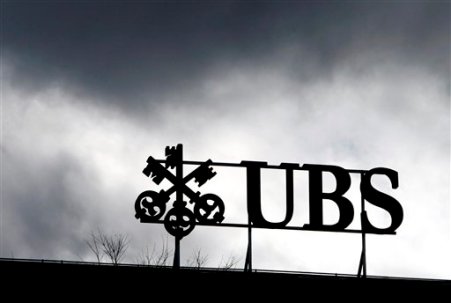The bank urges the Swiss parliament to sign a tax treaty with the U.S. -- or risk winding up on Uncle Sam's blacklist
Embattled UBS AG has warned that Switzerland's financial industry is at risk unless lawmakers approve a tax treaty with the United States, and that other Swiss banks may be next to face pressure from U.S. regulators.
In a letter to parliamentarians, the banking giant said the U.S. Internal Revenue Service has collected information on the cross-border activities of about 20 Swiss banks and may soon press for a crackdown on American tax evaders at these institutions as well.
UBS urged parliament to approve an August treaty signed by the U.S. Treasury Department and Switzerland's executive Federal Council on improving cooperation in tax evasion matters.
"The risks are very considerable for the Swiss financial center and the economy as a whole if parliament were to withhold its approval," UBS said in the letter, obtained Friday by The Associated Press. The bank confirmed its authenticity.
The Swiss government is scrambling to salvage the treaty after a Swiss court ruled in January that parts of it were illegal. It has asked parliament to sign off on the deal, which would temper Switzerland's strict banking secrecy law to meet Washington's demands for greater access to files on suspected American tax cheats.
"Apart from UBS, many other Swiss banks were involved in cross-border business with American clients," the Zurich-based bank said, referring to offshore accounts for wealthy U.S. customers.
"The IRS has obtained information on about 20 Swiss banks" as part of a recent amnesty program, UBS said. "It is quite possible that the IRS wants to obtain information on other customers of these banks. Refusal by Switzerland to meet its obligations under international law could send a signal that would escalate these cases."
A spokesman for UBS declined to say which banks were involved.
UBS also warned that Switzerland risked ending up on a blacklist of uncooperative tax havens if lawmakers refused to bless the deal, which was reached after months of tense negotiations between Washington and Bern.
Swiss companies doing business in the United States could then be subject to additional scrutiny by the IRS, it said.
U.S. authorities last year agreed to drop their demand for details of 50,000 of UBS' American clients, if the Swiss divulged the names of 4,450 believed to have been involved in large-scale tax evasion or fraud. In a separate deal, UBS paid a $780 million penalty as part of a deferred prosecution agreement that included disclosure of an additional 150 names.







